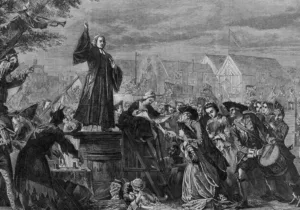Nationalism should form the bonds of social contract in any great power, and should not just be an idea that is despised by the far-left and usurped by the far-right.
After my first time in Washington, DC, I thought before leaving for London I’d visit the Smithsonian Institution’s National Portrait Gallery. Everyone has their peculiar sense of style and choice in art, and I always wanted to see the Capture of HBM Frigate Macedonian by US Frigate United States, October 25, 1812, painted by Englishman Thomas Chambers, on the 40th anniversary of Stephen Decatur’s triumph over the then naval hegemon, the British Empire. The painting is strange, given the marine art standards of the day (Ivan Aivazovsky, George Chambers, etc.). The subject is the War of 1812, often considered in Britain as a small theatre in the struggle for global hegemony with near-peer rival Napoleonic France. But for a rising power like the United States, the disarming and capture of a British warship was a defining triumph over British sea power. It was a national story. It was history.
The War of 1812 defined America as a nation and exacerbated a sense of Hamiltonian realism in a country. It highlighted that, while Jeffersonian agrarian republicanism is an overall good governing principle, a new nation in an anarchic world beset by great-power rivalry needs to be a part of a world order as a great power first. Europeans still looked at the American nation as a curious aberration with pretentious ideas that had failed throughout history, from the Roman republic’s collapse and transformation to an empire, to republican France, which was far more imperial in nature than monarchist France. But the War of 1812 was the war that led Theodore Roosevelt to write The Naval War of 1812, which led to Alfred Thayer Mahan’s classic The Influence of Sea Power upon History, which in turn led to Roosevelt starting a great naval, infrastructure, and industrial buildup. In short, the War of 1812 gave the United States a national story, and within 25 years of Teddy Roosevelt’s great national awakening, turned a small republic into a superpower.
In that light, the most interesting speech of the conference I attended while in Washington came from an unexpected source. It was unexpected because Rich Lowry is the editor of National Review, which published the “Against Trump” issue that gave rise to the entire Never Trump movement. During his speech, he said, “It is a time-honored cliché, manifestly absurd to claim the United States is an idea, and not a nation with defined borders. No one lives in abstraction.” The US expansion across the continent and military bases abroad are not simply ideas, but hard quantifiable power. Lowry’s speech was also the only one that had a shadow of a policy proposal: “Insist on assimilation of migrants, and resist every attempt toward bilingualism.” A nation cannot survive without shared culture, and shared culture needs “heritage, history, language, heroes, national rights, and symbols.” True. The speech was also important because, even though National Review had been critical of Trumpian American-First sentiments, at a time when conservative nationalism was only associated with Trumpism, Lowry painted a picture that was still distinctly conservative, but still liberal in nature. In that light, his new book The Case for Nationalism: How It Made Us Powerful, United, and Free is a handsome addition.
Lowry contends that nationalism has gotten a dirty rap that is wholly unjustified. In fact, nationalism can be unifying, emancipatory, egalitarian, and even liberal. And it should be completely bipartisan. His second contention is that America is, in a way, a betterment of a classical English tradition, one which is lost in England itself. American nationalism is a much purer and authentic form, one that, despite a few mishaps, is a broadly benevolent force. Third, he argues there are insidious forces within the United States that are not just against any form of nationalism, whether liberal or conservative, but against nation-states existing.
“Nationalism is flexible enough that either party can appeal to it. I think it was a mistake for many Republicans to lose touch with nationalism,” Lowry writes, adding, “It has been even more of a mistake for Democrats to throw in almost entirely with identity politics and a cosmopolitanism that is hostile to the prerogatives of the nation-state and emotionally detached from routine expressions of patriotism.”America has a tradition of nationalism that is wholly liberal and emancipatory, and traces its roots from Alexander Hamilton to Abraham Lincoln, Teddy Roosevelt, John F. Kennedy, and Ronald Reagan. “American nationalism, in particular, is not to be feared,” Lowry writes, as America is the true inheritors of an Anglo-American tradition, one “that has profound respect for the individual and the rule of law and is woven into the fabric of our country and a fundamental part of our national identity.” Lowry argues convincingly that nationalism across the world has been an emancipatory force against broadly transnational and imperial ideas, like colonialism, Marxism, and fascism. From George Washington to Lech Wałęsa, Giuseppe Garibaldi to Mahatma Gandhi, nationalism overall has been a benevolent and liberal force.
Nationalism is also a classic Anglo-Protestant gift. “Would America be the same if its people spoke Russian, the language of a country that has never effectively supported property rights, the rule of law, or limited government, rather than English? Would our political culture as we know it have emerged if practically every home in America a couple of hundred years ago had had a Koran on the bedstand rather than a King James Bible? Of course not.” Lowry argues English freedom “defined the American experience from the outset.” He builds upon Tocqueville’s observation that an American is an “Englishman left alone” and suggests that if “the eastern seaboard had been settled by Spaniards, you could have ‘left them alone’ for a very long time and marinated them in all the Enlightenment philosophers, and they still never would have come up with the American founding.” Interestingly, this puts his idea of nationalism at odds with Sohrab Ahmari’s idea of an original “Hispano-Catholic” American founding.
Lowry is at his best on the second point. Citing Hamilton, Roosevelt, Lincoln, and Reagan, Lowry argues American nationalism, with all its occasional flaws, is a deeply successful experiment. “Alexander Hamilton understood the cultural roots of national loyalty,” Lowry writes, citing Hamilton himself:
The safety of a republic depends essentially on the energy of a common national sentiment; on a uniformity of principles and habits; on the exemption of the citizens from foreign bias, and prejudice; and on that love of country which will almost invariably be found to be closely connected with birth, education, and family.
The same sentiment is found in Lincoln, who made the Union more perfect by making sure the aberration of Confederacy, based on an ethno-racist ideation, was nipped at the bud. But perhaps the most important argument was one by Roosevelt: without assimilation, there can be no nation. Lowry stands squarely against some on the libertarian right when he calls for a return to a Teddy Rooseveltian conservatism and an Americanization program. German, Italian, Irish, and Scandinavian migrants made sure they made an effort to assimilate into the United States by anglicizing names and adopting local customs, instead of carrying on with their own, something that Lowry argues is lost with current migrants. The idea of America as a melting pot is looked down upon by ideologues who are more interested in intersectionality and divisiveness.
As Roosevelt is quoted by Lowry, “We welcome the German or the Irishman who becomes an American. We have no use for the German or Irishman who remains such.” Lowry also argues the recent dilution of unifying totems needs to be reversed, and he again cites Roosevelt on respecting flags and a common English tongue. For example, Roosevelt wrote, “We believe that English, and no other language, is that in which all the school exercises should be conducted… He must revere only our flag; not only must it come first, but no other flag should even come second.” Roosevelt’s influence is prominent on Lowry’s policy suggestions. “He was adamant, nonetheless, that we, not the immigrants, set the terms of entry and life in this country. He called for ‘Americans, pure and simple,’ and advocated an ‘intense and fervid Americanism’ as the ‘one quality which we must bring to the solution of every problem.’”
Lowry argues historians, under the influence of Marxism and other leftist ideology, have failed to construct and write a unifying history. Media, academia, and other institutions are captured, by a cabal of people, to whom the very idea of the West is evil. “By 1980, the journal Marxist Perspectives listed 125 editors and organizational secretaries in academic institutions around the country,” and “the boundary separating Marxism from the history profession had disappeared.” Lowry is rightly dismayed that nationalism gets a bad rap, when even the excesses of nationalism, at its most corrupt form, cannot compare with the straightforward destructive record of Marxism, which enjoys a sort of theoretical hegemony in the social sciences. He cites Reagan, who feared “an eradication of the American memory that could result, ultimately, in an erosion of the American spirit.” In short, there needs to be a common story of shared glory “with some basics: more attention to American history and a greater emphasis on civic ritual.” If the conservatives and even liberals give up on nationalism, and loses the propaganda war to the left, there won’t be a nation in the future.
In that regard, Lowry’s book is an important milestone. Nationalism shouldn’t be a dirty word, despised by the far-left, or usurped by the far-right. It should be a basis for a common social contract. As Lowry rightly argues, for statist arch-conservatives like Alexander Hamilton, Teddy Roosevelt, to small-r Republican Ronald Reagan, to anti-imperial, arch-republicans like Thomas Jefferson and Abraham Lincoln, to arch-liberals like John F. Kennedy, the national symbols needed to be grand, reflecting the shared stories, sacrifices, and glory.
The Pluribus is only as good as long as the Unum remains strong.






 Sponsor a student for Christianity & National Security 2024
Sponsor a student for Christianity & National Security 2024